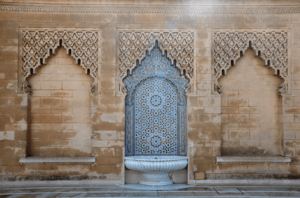We all want happiness. How we define this though, and how we seek it, differs. For some of us, happiness is wealth and material abundance. For others, it’s fame and renown. For others, it’s sensual pleasure and gratification. And for some, it’s a breakthrough in their field of expertise.
Amidst today’s unbounded pleasures and excess, however, more of us than ever remain unfulfilled. No matter how much we buy and consume, or how much we’re validated and gratified, there still lurks within us a void, a lingering feeling of emptiness that we cannot remove. That reassuring satisfaction and contentment we hope will come, actually never does.
It’s because we have suppressed and ignored an inborn instinct to know and worship our Maker. It’s this instinct that is man’s path to happiness. Allah says, “But whoever turns away from My Reminder will certainly have a miserable life, then We will raise them up blind on the Day of Judgment” (20:124).
Knowing Allah (subḥānahū wa taʿālā) and, as a natural corollary, upholding our obligations to Him, is the true antidote to today’s emptiness and despair.
“Truly in the heart there is a certain loneliness that cannot be removed except by spending time with Him in solitude. In it there is a sadness that cannot be removed except through the happiness of knowing Him and being true to Him … In it there is a void that cannot be filled except through loving Him, turning to Him constantly, always remembering Him, and being sincere to Him. Were a person to be given the entire world and everything in it, it would never fill this void.” – Ibn al-Qayyim (raḥimahullāh)
The Good Life
Allah (subḥānahū wa taʿālā) says in the Qur’ān:
مَنْ عَمِلَ صَٰلِحًا مِّن ذَكَرٍ أَوْ أُنثَىٰ وَهُوَ مُؤْمِنٌ فَلَنُحْيِيَنَّهُۥ حَيَوٰةً طَيِّبَةً وَلَنَجْزِيَنَّهُمْ أَجْرَهُم بِأَحْسَنِ مَا كَانُوا۟ يَعْمَلُونَ
“Whoever does good, whether male or female, and is a believer, We will surely bless them with a good life, and We will certainly reward them according to the best of their deeds” (16:97).
This āyah tells us that to live a good life, we need to be people of: (1) firm belief in Allah (īmān) and (2) righteous deeds (ʿamal ṣāliḥ)
What then is the ‘good life’? The ‘good life’ is the ‘paradise of this world’. It is a life in which a believer attains a deep sense of contentment, happiness and inner bliss through his worship, closeness and intimate conversation with his Creator.
Abū Bakr al-Warrāq (raḥimahullāh) defined ‘the good life’ as “the sweetness of obedience.”
What does it mean to ‘taste the sweetness of obedience’ or to taste the ‘sweetness of īmān’ (as mentioned by our beloved Prophet ﷺ)? Just as we enjoy the sweetness and incredible flavours of delicious foods with our mouths, īmān and worship also consist of a sweetness and special flavour which can be ‘tasted’ by our hearts. Thus, the ‘good life’ is the good life of the heart, and this is the real life.
In this world, the reward for īmān and righteous deeds is a good life. In the hereafter, however, there is even more, as we read in the āyah above: “We will certainly reward them according to the best of their deeds”. Imām al-Ghazālī (raḥimahullāh) said, “If the only reward of the person obeying Allah was the sweetness of the obedience, and feeling comfort in privately conversing with Him — it would be enough! Then how about the additional bliss of the hereafter?!”
Why Do We Not Experience the Sweetness of Iman and Worship?
Many of us exert ourselves in acts of worship, and yet do not experience this sweetness and happiness. One of the primary reasons is that we focus solely on the outer physical actions, and we do not give sufficient attention to the core of the worship: the inner state of the heart which accompanies it. Ibn al-Qayyim (raḥimahullāh) writes, “You may find a person who fasts, prays, does dhikr and recites Qur’ān abundantly, but nothing from his actions reach his heart: no fear, no hope, no love, no conviction in Allah and no happiness with Him.”
Thus, to attain a good life, we have to combine the external acts of obedience with the internal states of the heart, also called ‘the actions of the heart’. The actions of the heart include: firm belief (īmān), knowledge of Allah (maʿrifah), sincerity (ikhlāṣ), piety and mindfulness (taqwā), repentance (tawbah), trust in Allah (tawakkul), hope (rajā’), fear (khawf), gratitude (shukr), patience (ṣabr), love (ḥubb), yearning for Allah (shawq) and certainty (yaqīn).
Just as our bodies need food and drink to grow and sustain themselves, our hearts and souls need their food (‘soul food’) to flourish and stay healthy.
This will also mean having to purify our hearts from its diseases (pride, envy, greed, heedlessness, hypocrisy etc). When we are sick, we do not enjoy the taste of food. Sometimes we cannot even taste the flavour. If we are feeling nauseous, even the most expensive meal would not entice us to eat. Likewise, if our hearts are sick and diseased due to committing sins and following desires, we cannot enjoy the ‘sweetness of īmān’. We cannot find joy in worshipping Allah.
Ibn Taymiyyah (raḥimahullāh) said, “If you don’t find sweetness and joy in the deed you perform, then doubt its sincerity, for Allah (ʿazza wa jall) is Shakūr (Most Appreciative and Rewarding).” This means that Allah will reward His servant for his deeds in this world by granting him sweetness and tranquillity in his heart. But if he finds that his heart lacks delight and joy, then his deed is imperfect and defective.
The Good Life = A Life of Luxury?
We may think that the ‘good life’ is a life devoid of any difficulties; a comfortable luxurious life. On the contrary, those who enjoy the ‘good life’ may experience some of the worst worldly difficulties. However, despite the difficulties and severe illnesses they may suffer, their hearts are at peace. Their hearts are content with Allah’s decree. They may have very little material wealth, but their hearts are brimming with īmān and the love of Allah. Our beloved Prophet ﷺ is the person who best personified this. He ﷺ owned very little of the world: he would sleep on a simple mat which would leave marks on his blessed back, but despite this, he lived the best life.
Ibn al-Qayyim (raḥimahullāh) explains that the ‘good life’ in the above āyah does not refer to a life of fine clothing, food, drink and spouses, as Allah (ʿazza wa jall) may bestow this in far greater quantities to His enemies. But rather the ‘good life’ is the life of the believer who occupies himself with one goal: pleasing his Beloved (ʿazza wa jall). Instead of feeling confused and torn in many directions of life, the believer who enjoys the ‘good life’ has one focus. Everything he does and seeks is to attain the love and closeness of his Beloved.
When he speaks, he speaks for Him. When he is silent, he is silent for Him. When he moves, he moves for Him. When he is still, he is still for Him.
His focus is Allah. He lives for Allah. He dies for Allah.
The Good Life = A Life With Allah
A life with Allah begins with sincere repentance (tawbah), and revelling in the joy of reuniting with one’s Creator after having been away.
It is a life in which one relishes the sweetness of ṣalāh, as our beloved Prophet ﷺ said, “My utmost joy has been put in ṣalāh” (Nasā’ī). It is a life in which there is nothing more delightful and soothing to the heart than conversing and crying to one’s Lord in the stillness of the night, alone.
It is a life in which one feels the joy of hunger when fasting, and gives up his base desires —which he loves — for his Beloved, who he loves much more.
It is a life in which one makes the Qur’ān his best friend, and finds immense peace in its recitation as, “There is nothing sweeter to the lover than the words of his beloved, for it is the joy of their hearts and their utmost desire” (Ibn Rajab raḥimahullāh).
It is a life in which one happily serves his family, neighbours and the creation of Allah selflessly. It is life in which one overcomes his ego and emulates the sublime character (akhlāq) of Allah’s beloved, Muḥammad ﷺ.
It is a life in which one feels greater joy in helping others and giving charity than the recipients of the charity themselves. It is a life in which one is ready to sacrifice his own life, and cry out “By the Lord of the Kaʿbah! I have won!” (Bukhārī).
A life with Allah is a life in which the love of Allah supersedes everything else. It is a life of utmost dedication to Him, in which he loves to spend time worshipping Him, and his greatest desire is to meet Him and see Him in Paradise.
“By Allah, the world is only sweet with His remembrance; the Next Life is only sweet with His forgiveness; and Paradise is only sweet with seeing His Noble Face.” – Dhū al-Nūn (raḥimahullāh)
How Can We Attain the Good Life?
1. Knowledge. We have to continuously learn about Allah (ʿazza wa jall) through His Names, His Words, His creation and by worshipping Him. We have to learn about His beloved ﷺ who practically demonstrated to us how to live a ‘good life’, and we have to learn about the ‘actions’ and the ‘diseases’ of the heart. One of the predecessors said, “How misfortunate are the people of the world who left the world without having experienced its greatest delight!” When he was asked, “What is its greatest delight?”, he replied, “Knowing Allah, loving Him, finding comfort in His closeness, and longing to meet Him. ”
2. Battling the inner self (nafs). In our journey to Allah, the initial stages will feel very difficult at times. We have to persevere and keep going, until our hearts become attached to Allah. Once our hearts are attached to Allah, the acts of worship will no longer feel difficult and we will begin to enjoy them. Abū Zayd (raḥimahullāh) said, “I forced my nafs (inner self) to go to Allah whilst it was crying, until I was able to take it to Him whilst it was laughing.”
3. By performing all the obligatory deeds and additional voluntary deeds. In a ḥadīth qudsī, Allah states, “My servant continues to draw close to Me with voluntary deeds until I love him” (Bukhārī).
4. Spending time in isolation with Allah. This includes reciting the Qur’ān with reflection (tadabbur), dhikr with reflection (tafakkur), talking to Him intimately in heartfelt duʿā’; and combining all of the above in ṣalāh with humility and full focus (khushūʿ). This has a deep impact on strengthening our connection with Allah and increasing in love for Him. Al-Ḥasan al-Baṣrī (raḥimahullāh) said, “Indeed the beloved of Allah are those who have inherited the good life and tasted its bliss, due to conversing privately with their Lord and experiencing the sweetness of His love in their hearts.”
5. Staying aways from sins. Wuhayb b. Ward (raḥimahullāh) was asked, “Can the sinner taste the sweetness of worship?” He said, “No, not even the one who considers doing the sin.”
“The ‘good life’ is attained through lofty aspirations, true love, and a sincere intention.” – Ibn al-Qayyim (raḥimahullāh)
The Eternal Good Life
The worldly ‘good life’ is merely a glimpse of the eternal good life of the hereafter, the joy and pleasure of which is unimaginable. A saint of Allah said, “There are times when I say: if the people of Paradise have anything like this, then how blissful must their lives be!” Another stated, “There are times when the heart bursts in joy (out of the love for Allah).”
After quoting the above, Ibn al-Qayyim (raḥimahullāh) writes, “Glorified is the One who lets His slaves witness His Paradise well before they meet Him, who opens its doors to them in this world of deeds; and who gives them some of its joy, its breeze and its perfume, so that they may seek it and hasten towards it with all their strength.”
“There is an ‘early paradise’ in the world. It is to know Allah, to love Him, find comfort in Him, long to meet Him, fear Him and obey Him. Beneficial knowledge leads one to attain this. Whoever’s knowledge leads him to enter this ‘early paradise’, will enter Paradise in the next world. And whoever does not sniff the fragrance of the ‘worldly paradise’, will not sniff the fragrance of the Paradise of the hereafter.” – Ibn Rajab (raḥimahullāh)
Let us have firm belief in Allah (īmān) and do righteous deeds (ʿamal ṣāliḥ) so that we become from, “Those whose souls the angels take (in death) while they are good and virtuous. They will say to them, ‘Peace be upon you. Enter Paradise for what you used to do” (16:32).
Let us live a life with Allah, so that in our final moments, the angels will come to us and say, “Come out, O good soul that was in a good body! Come out praiseworthy, and receive the good news of serenity, bliss, and a Lord who is Pleased and is not angry” (Ibn Mājah).
Let us live a life with Allah, so that on the Day of Judgement, we will be led to Paradise. With its gates already open, we pray that the angels will welcome us saying,
سَلَٰمٌ عَلَيْكُمْ طِبْتُمْ فَادْخُلُوهَا خَٰلِدِينَ
‘Peace be upon you. You have been good so come in, to stay forever.”
May Allah – the Lord of Majesty and Honour – make us of those who relish and delight in His worship in this world, and of those who will be fortunate to gaze at His Magnificent Face in the Eternal Abode of Bliss.






